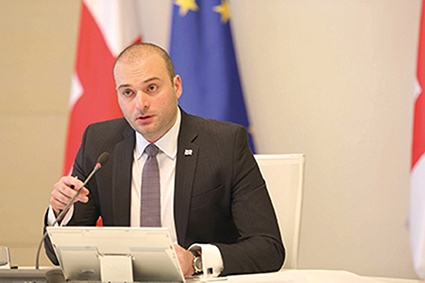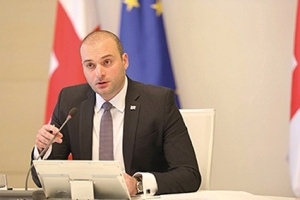Bakhtadze Announces New Promises for Education Reform
Georgian Prime Minister Mamuka Bakhtadze was interviewed this week by national news network Imedi TV. He spoke about the country’s education system and future plans for its development and reform.
Since coming to power, Bakhtadze has had a particular focus on education, consolidating the Ministry of Education and Science with the Ministry of Youth and Sport, appointing Mikheil Batiashvili as head of the newly formed Ministry of Education, Science, Culture, and Sport in July of last year.
Almost immediately, the Prime Minister instituted a major reform of the education sector. “We plan to implement a 5-level reform that involves the integration of preschool education, school education, vocational education, higher education and science, the introduction of innovative education systems, and more importantly, the deepening of close ties between education and economics,” Bakhtadze announced when appointing Batiashvili.
In Tuesday’s interview, Bakhtadze further discussed the now-ongoing reforms. He announced a focus on modernization and technology, saying that new modern kindergartens and fully-technologically equipped schools will be built “in every village, town, and city of the country.”
Another point of emphasis is European standards and integration with the European education system. The government has been working to integrate more European standards into the Georgian curriculum, and now promises that certificates issued by vocational education and training centers in Georgia will be accepted in Europe.
“It means that the young people will be able to be employed in Europe after graduating from vocational educational institutions [in Georgia]. The large-scale reform means that our higher education institutions will be represented in the world’s top rankings, we will have the most innovative research centers, laboratories, and we will be able to establish Georgia as a hub of education and science in the region, which is our mission,” explained Bakhtadze.
The Prime Minister tied the ambitious reform plan to what he called Georgia’s centuries’-old fight for “freedom, preservation of identity, and building a strong Georgian state.” The government’s top priority must be education, he insisted, “this is the only right vision to ensure sustainable development.”
Currently, the Georgian public education system is “among the worst in the world,” wrote Tbilisi-based economist Eric Livny in a recent blog post for Tbilnomics and GEORGIA TODAY. International education test PISA ranked Georgia 60th in science, 62nd in reading and 57th in mathematics, out of 72 countries included in the most recent PISA report from 2015.
“We face two main challenges - poverty and occupation,” said Bakhtadze, marking these as a barrier to Georgia’s historic aims and sustainably growth. He continued, “Education is the shortest way…from poverty to freedom. This is not just a reform, it is a national idea and the boldest national project since the day of our independence, which should ensure Georgia will be added to the list of countries with developed economies. The formula for the success of leading economies of the world is that the education sector is the main driving force. In the 21st century, if you do not spend 10-11% of your GDP on education, it will be difficult to compete.”
The Prime Minister repeated his bold new promise to increase education spending to 6% by 2022. He also emphasized the importance of private sector involvement, hoping that the increase in spending will motivate private companies to match investments in their future workforces. “As a result,” Bakhtadze prophesized, “education will become a dominant sector in the economy.”
GEL 1.6 billion ($600 mln) has been allocated for education in the 2019 budget, a significant increase from 2012, Bakhtadze notes, when the education budget was just GEL 600 million ($223.5 mln). For 2020, the government is committing GEL 2 billion ($745 mln), GEL 2.5 billion ($931 mln) in 2021, and GEL 3.4 billion ($1.27 bln) in 2022 – a quarter of the annual budget.
Bakhtadze also referenced the “Education Equality Act,” a new law aimed to ensure that “the current and future governments of Georgia…keep investments this high flowing into the education sector and steadily increasing it every single year.” The Equality Act locks in governments for the next decade to allocate at least a quarter of their annual budgets for education. “In the near future we will submit a relevant initiative to Parliament on the Education Equality Act,” promised Bakhtadze.
The Prime Minister insisted that the long-term, progressively compounding nature of education means that consistently growing investments are critical to the sector’s health and success as the basis of Georgia’s economic development.
By Samantha Guthrie
Image source: Press Office of the Prime Minister












